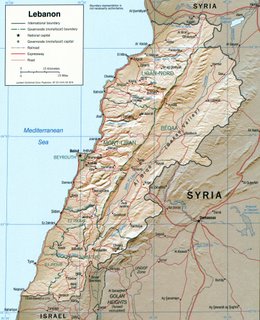
Avoiding the political angle of the conflict, opswarfare wishes to discuss the military aspects of this scenario, and how both sides can take the upper hand.
For Hezbollah, basically, they have to continue what they are doing now, and also in turn intensify their probing raids into the Israeli logistics tail. These raids create multiplier effects,
- disrupt enemy operations at their weak point
- find out more info about enemy built-up, especially forces held in reserve
- take the psychological upper hand (we still can strike you where it hurts)
- cause a portion of fighting soldiers to be left in the rear to help protect logistics units
-----------------------------------------------------------------------
As for Israel, it can consider conducting "thunder runs" if the terrain allows, and try to capture a "node" of the underground network intact. This may go some way into finding up more about the underground tunnels, plus also rocket storage areas.
The current air offensive basically cannot reap much benefits. Air-power-wise, Israel needs to use its UAVs (preferably high altitude type, to avoid MANPADS attacks) to detect rocket launching sites. Instead of attacking those sites, it may want to consider analysing the various sites to look for patterns, to try to locate the storage sites.
The special forces will have to utilise HUMINT to try to capture key Hezbollah leaders. This will help Israel win the war to "capture hearts and minds".
As long as both sides are allowed to operate without too much political "over-control", it will be an intriguing battle of tactics.